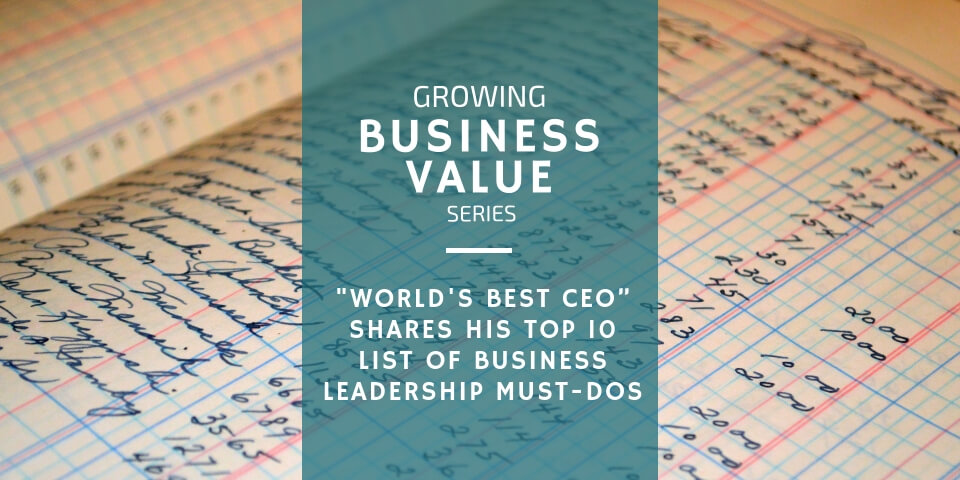
“World’s Best CEO” Winner Jeff Immelt Shares His List of Leadership Must-Dos
January 7, 2019
How to Build Pro Forma Financial Statements That WOW Investors
January 14, 2019The Essential Leadership Qualities List for Every Small Business Owner

When it comes to leadership, there’s no expert I rely on more than American author and pastor John C. Maxwell. As a companion book to his 21 Irrefutable Laws of Leadership, Maxwell wrote The 21 Indispensable Qualities of a Leader Becoming the Person Others Will Want to Follow. I’ve got to tell you. This is one of the top 10 books I recommend business owners read. For me, it’s powerful. So much so that I’m going to share with you my take on what I learned from the book, as a Certified Value Growth Advisor… the list of leadership qualities of successful small business owners.
Podcast Time Index for “The Personal Qualities of Small Business Leaders”
00:25 – The Personal Qualities of a Leader
01:49 – Character
03:46 – Charisma
04:47 – Commitment
06:51 – Communication
08:23 – Competence
09:56 – Courage
11:37 – Discernment
12:33 – Focus
14:17 – Generosity
16:28 – Initiative
17:27 – Listening
18:06 – Passion
19:04 – Positive Attitude
20:38 – Problem Solving
21:12 – Relationships
22:08 – Responsibility
22:54 – Security
23:31 – Self-Discipline
24:17 – Servanthood
25:05 – Teachability
25:48 – Vision
26:13 – Summary
John Maxwell said, “If you can become the leader you ought to be on the inside, you’ll be able to become the person you want to be on the outside. People will want to follow you, and when that happens, you will be able to tackle anything in this world.” You see, friends, leadership begins on the inside. It’s about knowing who you are and what makes you tick. If you’re secure in who you are, then people will want to follow you. They want to follow a genuine individual, not a fake. That’s not who they’re after.
So there are certain personal qualities small business leaders possess that make their team members want to follow them. Particularly, I believe Maxwell identifies the most important characteristics in The 21 Indispensable Qualities of a Leader. Therefore, I’m going to show you how those qualities bring out the best in small business leaders.
21 Essential Leadership Qualities Small Business Leaders Possess:
#1 Character
Distinguished British Field Marshall Bernard Montgomery once said, “Leadership is the capacity and will to rally men and women to a common purpose and the character which inspires confidence.” That’s what leadership is. It’s the capacity and will to rally men and women to a common purpose. But in order to inspire confidence in others, your actions must prove that you will do what you say you will do. Have you ever noticed how you feel about people who say they’re going to do something and then they don’t do it? What do you think about their character?
See, everyone is born with a little bit of talent. Each person has an innate gift. However, you’re not born with character. You develop character through the choices you make and the actions you take. Good character is doing what’s right even when no one is looking. Inevitably, good character brings people lasting success. But if you don’t have credible character, then you don’t even have a foundation on which to build success.
#2 Charisma
Another quality successful small business leaders seem to possess is charisma. First impressions often make or break deals and relationships, and those with charisma can usually make good impressions on others. Dan Reiland, vice president of leadership development at INJOY said, “How can you have charisma? Be more considerate about making others feel good about themselves than you are about making them feel good about you.” Those who lead don’t just talk about themselves. They bring out the best in others.
#3 Commitment
The next quality effective small business leaders possess is commitment. Actually, it’s what separates doers from dreamers. It’s getting up again and again every time you’re knocked down. It’s staying in the business game because the company and everyone in it depends on you. And It’s giving everything you’ve got and everything you are to succeed. Wherever you are, be there. That sounds simple, but it’s hard to do sometimes.
#4 Communication
Without effective communication, you’ll travel alone. You’ll never lead. Like I talked about in Things Leaders Do, you have to simplify your message. Care about your audience. Know who your team members and customers are. Be truthful. Believe and live what you say and seek a response because the goal of all communication is action. You are trying to elicit a response. Technology executive Gilbert Amelio said, “Developing excellent communication skills is absolutely essential to effective leadership. The leader must be able to share knowledge and ideas to transmit a sense of urgency and enthusiasm to others. If a leader can’t get his message across clearly to motivate and get others to act on it, then having the message doesn’t matter.”
#5 Competence
The fifth thing Maxwell deals with is competence. He says, “Competence goes beyond words. It’s a leader’s ability to say it, plan it, and do it in such a way that others know that you know how and know that they want to follow you.” In order for small business leaders to cultivate high competency, you have to show up every day and be ready to work. You’ve got to keep learning and growing. You’ve got to follow through with excellence. When you find something that is just above normal, continue doing it. You’ve got to accomplish more than you set out to do, and you’ve got to inspire and motivate others. That is competence.
#6 Courage
Have you ever been scared? Sure you have. I’ve been scared to death sometimes. Yet, somehow along the way, I’ve mustered up the courage to move forward, and so have you. That’s what small business leaders do. Like Eleanor Roosevelt said, “You gain strength, courage, and confidence in every experience in which you really stop to look fear in the face. You’re able to say to yourself, ‘I lived through this horror, and I can take the next thing that comes along.’ You must do the thing you cannot do.”
We’ve all been there, haven’t we? We’ve all been through tough times. So no matter what this world throws at you as a business owner, you can accomplish it. Sometimes, you just need to have a little bit of courage. You have to rest on what’s already been accomplished.
#7 Discernment
The seventh quality small business leaders have is discernment. Maxwell says, “Smart leaders believe only half of what they hear. Discerning leaders know which half to believe.” Every day, small business owners are approached with information, and effective leaders need discernment to know what to believe. Yet, we’ve all made our mistakes, right? One month before Jimmy Hoffa disappeared, he said, “I don’t need bodyguards.” Well, no one knows where Jimmy Hoffa is. So we all need discernment. We’ve all opened our mouths and inserted our feet, but we have to work with discernment to lead our businesses effectively.
#8 Focus
Next, leaders have focus. The sharper your focus is, the sharper you are. You have to prioritize. Concentrate on your priorities to become excellent. When you can harness both your priorities and your concentration, you have the ability to accomplish unbelievable things. Maxwell recommends focusing 70% of your time on your strengths, 25% of your time on growth and change, and 5% of your time on your areas of weakness. Don’t focus on your weaknesses. Rather, delegate them to people who are strong in your weak areas.
#9 Generosity
Small business leaders also tend to be generous. Maxwell says, “Your candle loses nothing when it lights another.” Think about it. You can have two candles. If you use one to light the other, the original one is still lit. Be grateful for what you have, and don’t allow possessions to control you. Regard your money as a resource. Give it away. Give and give and give. Life’s not all about getting. It’s about being able to use the abilities and skills that you have to encourage others. That’s what a leader does.
#10 Initiative
A leader also deals with initiative. Conrad Hilton of Hilton Hotels said, “Success seems to be connected with action. Successful people keep moving. They make mistakes, but they don’t quit.” Leaders take the initiative, make things happen, and are able to get things to work. You see them working that one hour longer and reading that one extra book. Leaders take on more risk, and with that risk, they’re going to make a lot of mistakes. It’s just going to happen, but leaders aren’t going to quit.
#11 A Listening Ear
Leaders listen. We’ve all heard that God gave us two ears and one mouth, right? We have to be silent to listen. Interestingly enough, if you spell out s-i-l-e-n-t and you spell out l-i-s-t-e-n, the same letters form both words. As Woodrow Wilson said, “The ear of a leader must ring with the voice of the people.” John Maxwell put it this way; “A good leader encourages followers to tell him what he needs to know, not what he wants to hear.” If you keep your ear out, you might actually find some secrets to success.
#12 Passion
Next, leaders have passion. They take life, and then they love it. They take life and live it. Life’s short, so leaders concentrate on what they do well, and they do it better than anybody else. I love that. That’s passion. What makes it possible for ordinary people to achieve great things? Why can they do it? According to John Maxwell, 50% of all CEOs of Fortune 500 companies had “C” averages in college, and more than 50% of millionaire entrepreneurs never finished college. Their passion made the difference. They knew what they wanted, and they didn’t give up. Those leaders did what they loved to do, and they did it well. Then, they did it better than anybody else did.
#13 Positive Attitude
With all that passion, leaders must have positive attitudes. Like character, your attitude is your choice and it determines your actions. I heard someone say, “Your attitude determines your altitude.” In other words, your attitude determines how far you will go. As John Maxwell says, “Maintaining a good attitude is easier than regaining one.” Sure, you may be discouraged about your business, but don’t give up. Keep a positive attitude. You can accomplish your goals, and a positive attitude can help you do that.
#14 Problem Solving Skills
Additionally, leaders are able to solve problems. In his book, John Maxwell said, “You can measure a leader by the problems he tackles. He’s always looking for ones his own size.” If it’s a big problem, it’s a big leader. If it’s a small problem, it’s a small leader. Leaders with good problem-solving abilities can do five things. They can anticipate the problem, accept the truth, see the big picture, handle one thing at a time, and keep going even when they’re down.
#15 Relationships
Another thing leaders deal with effectively is relationships. They get along with others. Theodore Roosevelt once said, “The most important single ingredient to the formula of success is knowing how to get along with people.” I have to tell myself that every day. See, all people want to feel special. If you want to achieve success, you have to give people hope and make them feel special. Compliment them and show them how to accomplish their goals. Speak about them before you speak about yourself.
#16 Responsibility
Additionally, leaders take responsibility. They won’t let you outwork them. They won’t make you carry the ball. Michael Korda, the editor-in-chief of Simon & Schuster said, “Success on any major scale requires you to accept responsibility. In the final analysis, the one quality that all successful people have is the ability to take on responsibility.” Gilbert Arland even said, “When an archer misses the mark, he turns and looks for fault within himself. Failure to hit the bullseye is never the fault of the target. To improve your aim, improve yourself.” That is the result of taking responsibility.
#17 Security
Leaders are secure within themselves. Andrew Carnegie said, “No man will make a great leader who wants to do it all himself and take all the credit for doing it.” Great leaders realize that other people around them can help them. Yet, they are secure enough in themselves to make up their own minds without following the crowd.
#18 Self-Discipline
Being secure within yourself can also make you self-disciplined, another characteristic of small business leaders. Essayist John Foster said this about self-discipline: “A man without direction of character can never be said to belong to himself. He belongs to whatever can make captive of him.” Part of being a business owner is being self-disciplined. You have to be disciplined and get up in the morning even when no one tells you to get up. You have to be disciplined and get the job done when no one else is looking. Then, you have to be disciplined and take care of yourself, your family, and everyone else who is relying on you. Much depends on you, so stay disciplined.
#19 Servanthood
The nineteenth personal quality small business leaders possess is servanthood. Famous theologian and physician Albert Schweitzer said, “I don’t know what your destiny will be, but one thing I know: the ones among you who will be really happy are those who have sought and found how to serve.” Think about that. See, a true leader serves. In modern terms, they practice servant leadership. By serving your team as a small business leader, you can impact them and lead them.
#20 The Ability to Be Taught
Besides the ability to serve, leaders possess the ability to be taught. You can lead if you’re not learning. Famous basketball coach John Wooden said, “It’s what you’ve learned after you know it all that counts.” Have you been there? Have you ever thought you knew it all? It’s what you learn after that period that sets you apart as a leader. Your growth determines who you are, who you attract, and how successful your organization is. Therefore, if you want your small business to grow, you have to remain teachable.
#21 Vision
Finally, great small business leaders have vision. Vision is everything for leaders. It leads the leader, paints the target, and sparks the fuel. It’s also the fire that others will follow. As John Maxwell said, “A great leader’s courage to fulfill his purpose come with passion, not position.”
PURCHASE HIS BOOK ON AMAZON: The 21 Indispensable Qualities of a Leader Becoming the Person Others Will Want to Follow
Leadership Begins and Ends with Small Business Owners
So friends, there are the 21 irrefutable laws of leadership qualities according to John C. Maxwell with my interpretations. I don’t know about you, but as I review this list, I’m amazed at how weak I am as a leader at times. I need to make many self-improvements, but as Walt Disney said, “If you dream it, you can do it.” We can do this. And one way to be the best leader is to take this list and identify the qualities we possess and improve upon the ones in which we are weak.
By leading well, we can raise up other leaders within our organization. Thus, we don’t have to bear the entire weight on our own shoulders. That alone adds value to our companies and worth to our businesses. So be sure to look for my next article where I talk about how to train leaders in all areas of your business!



